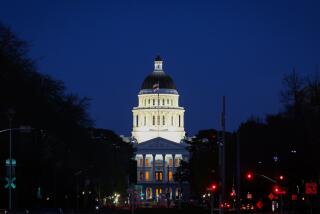Gov. Jerry Brown signs budget with few changes — or complaints
SACRAMENTO — Flanked by fellow Democrats and other political allies, Gov. Jerry Brown approved California’s new budget Thursday, changing very little of the $96.3-billion spending plan before signing it into law.
Brown said California’s finances are “in very solid shape” after years of deficits and touted increased spending on schools and healthcare for the poor.
“It is a big day for schoolkids. It’s a big day for Californians who don’t have healthcare,” Brown said. “California is the leader. The rest of the country is looking to see how we did it.”
The budget, which takes effect Monday, will change education funding, diverting some money from wealthier schools to districts with large numbers of poor students or English learners. Brown also signed bills expanding healthcare, part of President Obama’s federal overhaul.
Although the final budget hews closely to the governor’s original blueprint, it also includes new funding sought by Democratic lawmakers for welfare, university tuition assistance, mental health and dental care for poor adults.
“Today represents great progress,” said Senate leader Darrell Steinberg (D-Sacramento). “Real people hurt for so long will get some help.”
Tax revenue has continued to outpace Brown’s expectations since he reached a budget deal with lawmakers, but the governor said it would be unwise to count on the surge to continue.
“We live in uncertain times,” Brown said. “There’s a lot of unknowns out there in Washington, in Europe, in Asia, in technology, in real-estate growth.”
The governor used his blue pencil in several places.
He eliminated a measure that would have increased transparency at the Judiciary Council, the policymaking branch of the state court system. Brown’s finance director, Ana Matosantos, said it would have cost the courts too much, though she said she did not have a specific estimate.
The measure “doesn’t appear to be warranted or necessary at this time,” she said.
Assembly Budget Chairman Bob Blumenfield (D-Woodland Hills) said the governor’s decision was a “huge mistake” that would make it harder to root out wasteful spending.
“The public has a right to know the decisions affecting access to justice and the inner workings of an entire branch of government,” he said in a statement.
In a conference call with reporters, California Chief Justice Tani Cantil-Sakauye said she lobbied against the requirement, which she viewed as too broad and too hasty. She pledged to begin increasing transparency next year.
“It has to be thoughtful and deliberative,” she said.
Brown also stripped out $30 million for special education, part of the Legislature’s plan to ensure that all special education students receive the same amount of funding from the state. The governor said the plan would be too pricey in the long run, with costs reaching $300 million in future years.
Another veto scaled back money for preschool, reducing this year’s increase from $30 million to $25 million.
Thursday marked the end of a relatively smooth budget process, particularly by California standards. Even Republican criticism was subdued.
Senate GOP leader Robert Huff (R-Diamond Bar) said the budget “includes some positive steps forward in education funding.” But he said Democrats should have sent even more money to schools, and he criticized them for failing to address nearly $200 billion in unfunded retirement costs in coming decades.
“Keeping promises to the people of California on education funding and paying off our state debt load so as not to burden future generations with our mistakes should have been the first priority, but unfortunately that did not happen,” Huff said in a statement.
In addition to a $96.3-billion general fund, the budget contains $42 billion from accounts funded by dedicated taxes and fees, and $7 billion in bond money.
Times staff writer Paige St. John contributed to this report.
More to Read
Sign up for Essential California
The most important California stories and recommendations in your inbox every morning.
You may occasionally receive promotional content from the Los Angeles Times.











